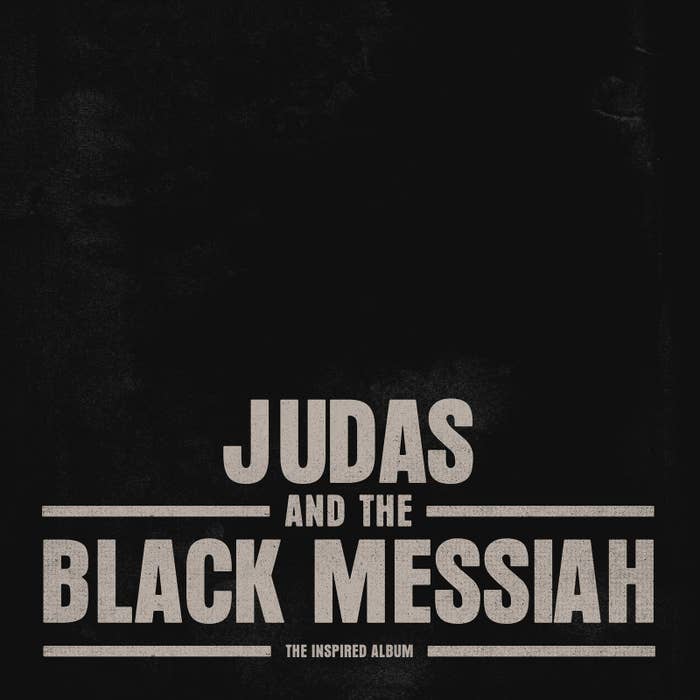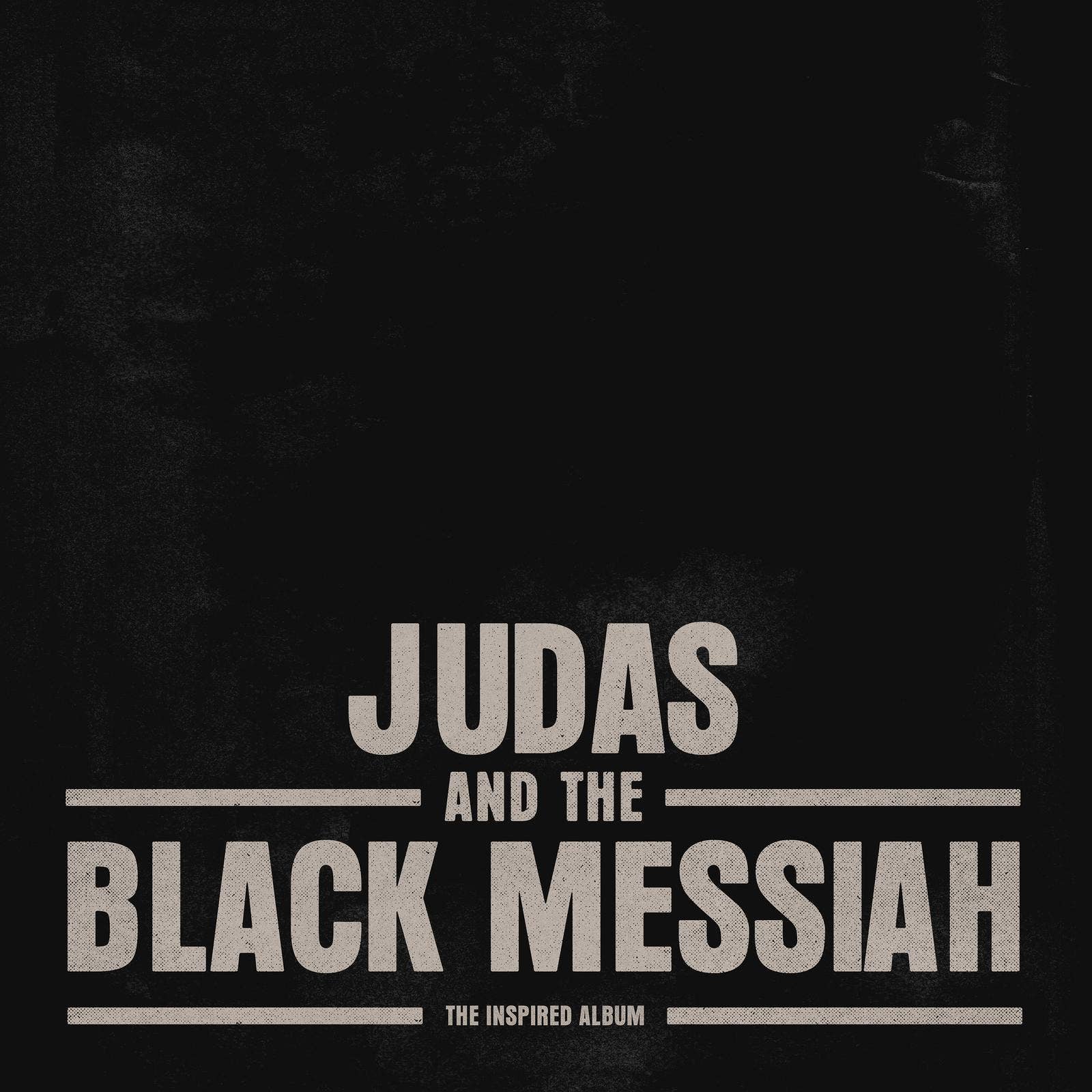
In January, Madlib told The Guardian, “Rap right now should be like Public Enemy—but it’s just not there.” The recently released Judas and the Black Messiah soundtrack would have been a perfect chance for him to be proved wrong, but it affirmed his sentiment. The 22-track project, full of songs being billed as inspired by the film, has its moments, but it doesn’t properly champion Fred Hampton’s legacy as a fiery orator, staunch critic of American imperialism, and revolutionary socialist.
The Six Course Music Group/RCA Records-released compilation is attached to a movie about Chairman Fred Hampton, a Black Panther who was assassinated in 1970. The Shaka King-directed film follows his efforts to unite Chicago—but also FBI asset William O’Neal’s infiltration of the Panthers, which led to Hampton’s murder at the hands of Chicago Police. The soundtrack does its best to parallel the retelling of Hampton’s final years, and there are rousing moments that display elements of his militance and anti-carceral ethos, specifically the tracks from Black Thought, Rakim, Polo G, and White Dave. But too much of the project demonstrates Hampton’s absence more than his presence. Little of his messaging is reflected in too-often vapid lyrics. The project’s lows show what happens when radical movements are extinguished, and capitalistic ethos reign.
Political education was once a bedrock of rap. Too Short was rapping about “The Ghetto” in between his pimp tales. Rakim was wearing luxury fashion and Benz chains, but his music was infused with pro-Black Five Percenter messaging. But radical movements are no longer as prevalent in Black communities. And the more that rap has become a tool of corporate America, the less we’ve seen genuinely militant music released. That circumstance has resulted in a compilation full of artists and lyrics at odds with Hampton’s message.
That dynamic is exhibited throughout the soundtrack. Jay-Z and Nas’ appearances were marked by braggadocio and material excess that would have likely disgusted Hampton, who famously proclaimed, “We’re not going to fight capitalism with Black capitalism.” Nardo Wick’s “I Declare War” aspires to be a call to arms, but doesn’t delve past surface-level lyrics to explore what war actually means to him and why it’s necessary. ASAP Rocky’s 2017-recorded “Rich Nigga Problems” felt out of place on the project. And unfortunately, G-Herbo and Lil Durk, sons of Chicago like Hampton, delved into self-medicating and menacing threats on their solo tracks (though Herbo shined on “Revolutionary” with Bump J). They both show how much the city needs movements like the Panthers.
The younger artists shouldn’t be condemned for their offerings. At a certain point, people only know what they know. And again, the project had solid tracks, which could be an enjoyable listen in a vacuum, but not attached to Hampton. It’s glaring that so few of the songs had the fire, political insight, and urge to educate that the film tried to communicate. But it’s not surprising. There’s a lot to be said about the optic of a Hollywood feature film about the FBI’s COINTELPRO tactics that are likely still going on. And by extension, RCA’s curation of the project indicates that there’s a gulf between Hampton’s radical politics and what passes as radical messaging in contemporary rap.
The rap songs that work best are staunch indictments of racism that identify the manifestations of systemic oppression, delivered with the urgency that channels Black and Brown people’s collective fury at racial injustice. On “Welcome To America,” Black Thought raps about his descendants’ experience in the struggle for racial equality, before affirming, “Blackness is my religion to that I’m dedicated,” and portraying the struggle of an incarcerated person by poignantly rhyming, “They told me that time is master, well I’m serving it now.” A cursory listen to the hook could make one feel like it’s a commercial for “the land of opportunity,” but singers C. S. Armstrong & Angela Hunte observe, “You can be a saint or a sinner or a billionaire/Or just stand on your feet.” In this country, where you can “get murdered on these streets” for no reason, perseverance alone is a virtue—regardless of what grind culture says. Aspiration isn’t always possible when America seeks to knock us off our feet everyday.
White Dave is similarly passionate on the Hit-Boy produced “Appraise,” where he ponders, “How can you appraise man,” while acknowledging, “Being black is the crime,” and decrying police brutality. He laments, “Black bodies laid inside a grave without a chance to fight/Won’t ever change long as police is still militarized.”
It could’ve been a fiery exhibition of artists exploring radical concepts that inspired listeners to read more about. But instead, it feels like a product of industry, with too many artists just turning in a token “conscious track” for a soundtrack look.
Polo G ruminates on that same plunder on “Last Man Standing,” where he rails at the consequences of civic negligence in his native Chicago. He rhymes, “No wonder why it’s hustle or die, and clap hammers,” illustrating the links between politicians underserving neighborhoods and the violence that manifests from poverty. The Panthers, including Hampton, realized that the people needed basic resources before they were able to give their all to the movement, hence initiatives like their free breakfast program. But now, with minimal help from the city, and without widespread mutual aid, people’s hunger begets them trying to get a dollar in manners destructive to themselves and their community. Polo gets it.
The 22-year-old Polo G is one of the youngest artists on the project, and he hits the mark in a way that reminds how young so many of the Panthers were. Hampton was 21 when he died, and many of his cohorts were in their early 20s.
There were other tracks from Chicago artists on the project, with themes that don’t seem as inspired by Hampton as much as conspired by the government that sought to assassinate him. Lil Durk’s “On Your Mind” is a melancholy confessional which starts off with the admission that, “Only thing make me safe is the pills to take a nap.” And while G-Herbo did his thing with Bump J on “Black Revolutionary,” his solo track “All Black” was disheartening. The song starts with him noting, “They gon’ die for me like a lifeline/They gon’ ride for me for a lifetime,” over regal horns, which channels the fierce loyalty Hampton’s Panther peers had for him. But then Herbo delves into talking about how those riders are his shooters, before rhyming, “I’ve been floodin’ the hood, that’s nothing.”
This track inadvertently demonstrates the manifestation of the film’s antagonists: the FBI. So many of the community protection organizations ended up losing their way as the Panthers were disbanded, taking their guns and aiming them at each other in gang conflicts that have now become generational and seem hopeless to stop. Herbo has spoken on how that conflict shaped his upbringing. In another life, he could’ve used his magnetism to be a revolutionary himself. He still can be. But his track represents the millions of youth sidetracked by the conditioning of survival mode, where it’s do or die. “All Black” is a bleak, if morbidly necessary moment on the project.
While some of these younger artists offered a mix bag, the “God MC” Rakim told Hampton’s story on “Black Messiah,” a track that offered “love, appreciation, and respect” to Hampton and the Panthers. The song is a well-crafted chronicle of Hampton’s life, which doubles as a synopsis of the movie. Rakim comes from an era of New York City when the Nation Of Gods and Earths roamed the streets. These spiritual sects were started by people who had proximity to movements like the Panthers. Because of them, “knowledge of self” was paramount, and even the drug dealers were up on the 120 lessons, which presented the doctrine of Black people as Gods. And while there’s much criticism about the troubling aspects of those movements, at least they were centered in a pro-Blackness and sense of community that allowed one to take what they wanted from their messaging, but leave the rest.
Jay-Z and Nas were right in the thick of that era, and have referenced 5-percenter messaging in their music (and fashion choices). But their offerings to the soundtrack were disappointing. While both made seemingly obligatory references to Huey P and Hampton, some of their other lyrics were antithetical in an almost disrespectful manner. On “EPMD,” Nas started a confounding track with a hook about being “at the mafia table...countin’ a million,” before starting his verse by rhyming about infamous mob boss John Gotti running “every union in the city.” He then spent the rest of the song talking about how long he’s been on top, his “Murcielago mob flow,” and “condos in different time zones.” He ended the track rhyming, “It was go get it, now it’s gimme/And we ain’t relyin’ on no stimmies.” Is that a dig at the millions of poor people who need aid? On the soundtrack for a revolutionary who relentlessly fought for the people? This was likely a leftover track that Nas and album co-executive producer Hit-Boy stuck on the project from their extended studio sessions, and he didn’t actually create this based on how the film inspired him. Regardless, this capitalistic ode to excess stuck out like a sore thumb.
Jay-Z’s “What It Feels Like” verse was a little more on the mark, but still fundamentally off. Yes, Jay’s rapping ability and command of cadence is incredible, the Scorpion and Michael Jackson flips were slick, and he had urgent bars about the hypocrisy of the Capitol insurgency, but it’s when he compares himself to “the chairman mixed with Jeff Fort,” then immediately brags about being on a jet, that he falters.
Jay has called himself “the Mike Jordan of rap’” and even “the new Sinatra.” Those references usually serve to liken himself to other people who are supreme in their field of entertainment. But it doesn’t work to apply that to paralleling himself with Che Guevara or Fred Hampton. Those revolutionaries didn’t vie to be supreme, they devoted their lives to the people in lieu of seeking the riches that Jay-Z covets. He’s done many positive things, but he’s also the exact kind of figure that Hampton would censure as a Black capitalist and unabashed billionaire. Hampton actually threatened to beat Black capitalists with a Black Panther newspaper. It’s not likely that if he were still alive, he’d be celebrating songs with artists co-opting his movement’s messaging while upholding a system that exploits so many more than it helps. While Jay’s pro-Blackness and altruism affect how he moves within the corporate structure (sometimes), he’s still vying to ascend that structure; Hampton wanted to dismantle it.
Nas and Jay-Z’s offerings feel like, as they’ve made more money, they’ve conflated Black Power to mean not “fight the power,” but “be the power.” Ditto to ASAP Rocky’s “Rich Nigga Problems,” which is a track he recorded fresh out of Swedish jail in 2017. His “you just don’t wanna be famous” refrain would have been better served on a track where he, or another artist, explored the counterproductive effects of activists being idolized like celebrities. Instead, what we have is another track on a project spotted with songs more materialistic than revolutionary. The project was presented as songs inspired by Judas and the Black Messiah, and hence Fred Hampton, with a press release characterizing it as a “collection of powerful music destined to inform and inspire today’s generation.” But too many tracks missed the mark.
Is this an anomaly, or proof that there are too many mainstream artists who lack the range? Too many artists couldn’t stay focused, and didn’t offer much beyond surface-level references to Huey P. and co-opting of social justice language. Why were still-incarcerated Black Panthers not mentioned? Why were Hampton’s views on America’s worldwide imperialism not referenced once? These are still-pressing matters, but unfortunately they don’t seem to be urgent enough to the artists on the soundtrack.
Hampton once called the press “apologist and ideological servants of American fascism and international imperialism.” It seems some artists operate in the same way as figures more intent on serving American empire than toppling it. Last year’s uprising after the death of George Floyd was marked by notable silence from some of the very names who have made millions from pro-Black messaging. No one is looking for any of these rappers to actually be anything close to a Black Panther, but some of them could have at least pretended better with these songs. The audacity for some of these artists to write violent lyrics and extol capitalism on an album about a Black Panther reflects a conditioning and unchecked ego which is a consequence of being deified by fans who don’t know any better themselves. Social justice movements have long passed the illusory need for a solitary Black messiah, with most movements instead operating with a decentralized structure. That phrase has been left to be co-opted by people who think being a Messiah figure hinges on wealth instead of wealth of knowledge—and we hear that misconception throughout the project.
It could’ve been a fiery exhibition of artists exploring radical concepts that inspired listeners to read more about. But instead, it feels like a product of industry, with too many artists just turning in a token “conscious track” for a soundtrack look. Its lowlights harken to the oft-spoken idea that mainstream hip-hop has lost militance, incisiveness, and danger the more it’s assimilated into pop culture. Perhaps it’s now foolish to expect potent anti-establishment messaging from figures of the establishment. There are artists who excel at pro-Black messaging, expressing the pain of oppression and our rage with the police system. But when it comes to more layered ideas about how to mobilize and the insidiousness of white supremacy and capitalism, not enough of them have anything to bring to the table. On the Judas and the Black Messiah soundtrack, we needed more Black Thought, less Black capitalism.




